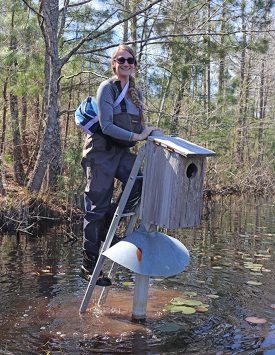Dr. Sydney Hope
PHD FELLOW GRADUATE | Global Change Center
VT Graduate December 2019, Fish and Wildlife Conservation
Advisor: Dr. William Hopkins
Google Scholar • shope@vt.edu

Sydney joined Dr. Bill Hopkins’ lab in the department of Fish and Wildlife Conservation in August 2014, and completed her degree in December of 2019. Her general research interests include animal behavior and physiology and how they are affected by changes to the environment at all stages in life. Sydney previously conducted postdoctoral research at the Centre d’Etudes Biologiques de Chizé in France, studying how subtle changes to the environment in which animals develop can have significant and long-term consequences for their morphology, physiology, behavior, and survival. In spring 2023, she began a postdoctoral position to study cognition in Asian elephants at Hunter College, City University of New York.
Sydney graduated from The College of New Jersey in 2014 with a B.S. in Biology. During her undergraduate career, she studied the effects of springtime temperature and urban habitat on the molt dynamics of the Carolina chickadee (Poecile carolinensis) in natural and urban populations in New Jersey.
In Summer 2013, she participated in an REU with Indiana University. She conducted a project investigating how an acute stressor affects aggressive behavior in Oregon juncos (Junco hyemalis) in a rural population and a newly colonized urban population in Los Angeles, California. During this project, she was intrigued by juvenile junco behavior and investigated both juvenile and adult junco behavior in rural and urban populations.
At Virginia Tech, Sydney studied the effects of the early environment on offspring development and is investigating the effect of incubation temperature on the exploratory and boldness behaviors and neuroendocrinology of Wood Duck (Aix sponsa) ducklings. Because incubation temperature is regulated by parental behavior, environmental changes such as climate change and human disturbance may affect adult incubation behavior, and thus incubation temperature. Previous research has shown that incubation temperature has many effects on offspring morphology and physiology, but its effects on behavior are unknown. Behavior is important to understand because it is the means by which animals interact with their environment, whether it is food or a predator. Any affects of incubation temperature on offspring behavior may reveal subtle but substantial effects of environmental change.
Last updated May 2023.


